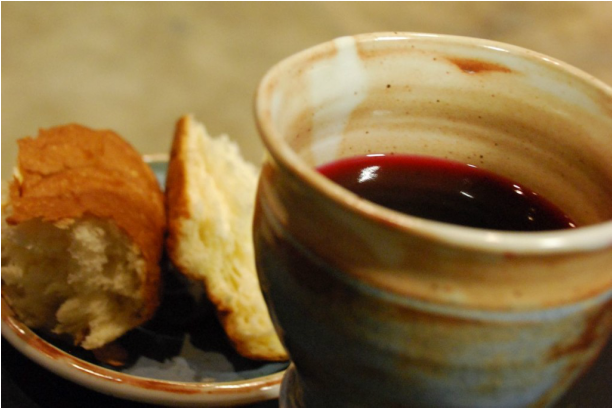In the Byzantine Liturgy the distribution of Holy Communion begins with the priest saying: "Holy Things for holy people." It is a shame that this phrase is omitted from the Latin rite because it touches the heart of what coming together to celebrate the Eucharist really means.
 We gather around our family tables not merely to eat and drink but to be healed of anger, to be refreshed in our weariness and to strengthen the bond of love and concern that makes us a family. So, too, Jesus invites us to gather around the table of the altar to give and receive reconciliation and forgiveness, to be filled with new vigor when we have grown tired in our struggles and to reinforce the unity in faith and love that makes us a "holy communion," a group of holy people bound together as disciples of faith.
We gather around our family tables not merely to eat and drink but to be healed of anger, to be refreshed in our weariness and to strengthen the bond of love and concern that makes us a family. So, too, Jesus invites us to gather around the table of the altar to give and receive reconciliation and forgiveness, to be filled with new vigor when we have grown tired in our struggles and to reinforce the unity in faith and love that makes us a "holy communion," a group of holy people bound together as disciples of faith.
For centuries the Eucharist was made more and more remote, locked in the Tabernacle, barricaded behind altar railings and forbidden to so many of the faithful because of legal impediments. Rigid laws of fasting kept many from receiving and consciences overladen with guilt kept good people away from the Eucharist when they were most in need of its healing and comfort.
All the words of Jesus concerning the Eucharist speak a different language. He offers His Body as the Bread of Life. He says strongly: "If you do not eat the flesh of the Son of Man and drink His blood, you have no life in you." And He clearly intended that this great Gift should be seen as a source of reconciliation, unity and service among His followers.
This is not a new attitude. It reflects the urgent invitation of Jesus Himself to all of us not only to RECEIVE His Body and Blood, but also to BECOME His Body and Blood for others.
This is the challenge of the Eucharist. For unless we are willing to gather with all who make up this "holy people" - saints and sinners, rich and poor, traditional or progressive, "accepters," believers, seekers, doubters, dissenters - then what we eat and drink becomes a judgment against ourselves.
Diversity should not be an obstacle or a threat to us. We should realize how the church of Christ is enriched by the great variety of ideas and thoughts and dreams that are brought together as we come to celebrate and to be nourished in the Eucharist.
The feast of Corpus Christi is a witness to this. Our oneness in faith and love is the strongest evidence that Jesus and His spirit are in fact working among us to bring all people together in the peace and justice of God's kingdom. It is the testament of a shared "communion" in which we are all aware of our commitment to become a "holy people' - to "be" the body and blood of Christ in all we do.





